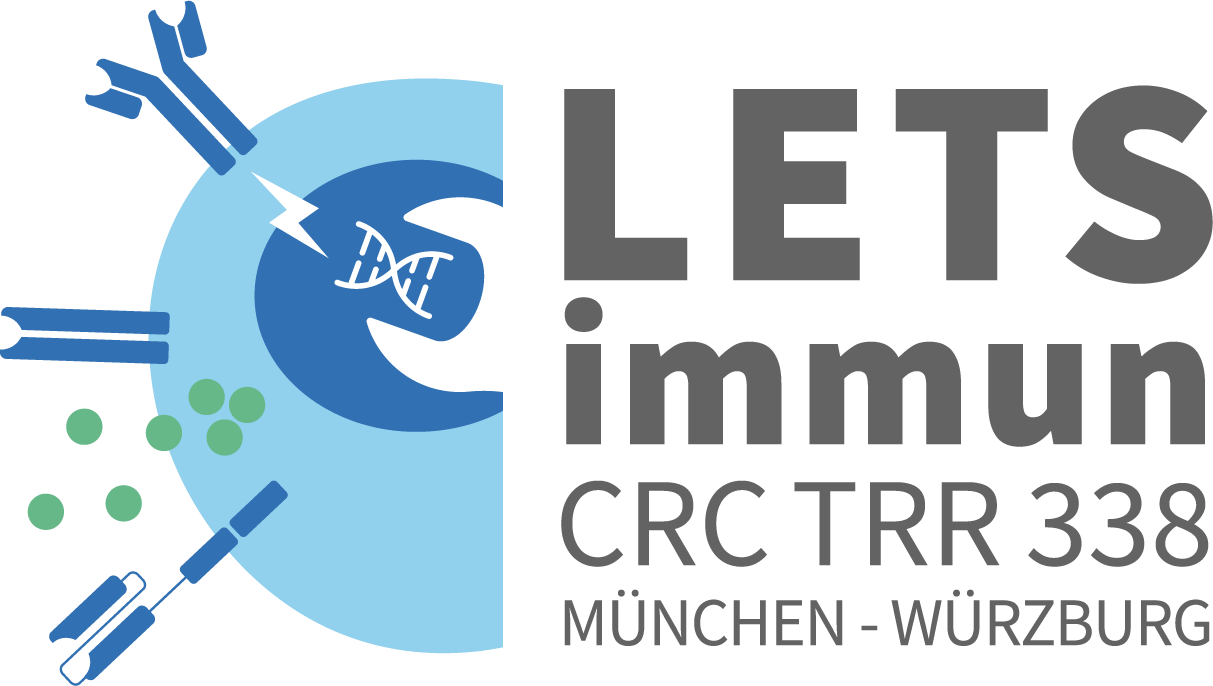Title
Bench-to-Bedside ATMP Development Platform
Research Area
Good Manufacturing Practice (GMP) Good Clinical Practice (GCP)
Project Summary
Within the CRC/TRR, several gene-engineered T cell products (advanced therapy medicinal products, ATMPs in ‘regulatory’ terminology) are being developed. The ambition is to advance some of them into first-in-human (FIH) clinical trials within the CRC/TRR lifetime, even though funding for such clinical trials will have to procured from other funding schemes. Project Z02 serves as a gateway infrastructure and service project to enable and facilitate the clinical translation of selected ATMPs from the CRC/TRR portfolio.
The conduct of a FIH clinical trial with ATMPs in Germany, according to the applicable law, requires:
i. a manufacturing license to produce the cell product in an accredited GMP clean room facility (issued by the local state authorities, i.e. in Munich and Würzburg, respectively);
ii. a clinical trial authorization to treat patients at an approved clinical trial site (issued by the Federal Agency for Biomedicines and Vaccines, the Paul-Ehrlich-Institute, PEI);
iii. an ethics approval for the clinical trial (issued by the Institutional Review Board, IRB at the respective clinical trial site).
Accordingly, the PIs of this project Z02 have been selected based on their distinguished expertise in clinical trial design and conduct in cellular therapy (Einsele), regulatory affairs and GMP manufacturing (Hildebrandt / Priesner), and ethical aspects in personalized medicine (Marckmann).
Several CRC/TRR projects are developing innovative cell products that involve CRISPR/Cas9 gene-engineering, including orthotopic T cell receptor replacement (OTR) and genome-editing to enhance the safety and efficacy of TCR-transgenic and CAR-T cell products. The ambition in project Z02 is to pave the way for a first manufacturing license for a T cell product that involves CRISPR/Cas9-based gene-engineering in Germany. As proof-of-concept ATMPs, we will develop CMV-specific T cells that were gene-engineered by OTR to treat refractory CMV infection (project A01, Busch) and FLT3-specific CAR-T cells for the treatment of acute myeloid leukemia (AML; project A02, Hudecek). Both projects use a ‘common trunk’ in the GMP manufacturing process to accomplish targeted insertion of TCR vs. CAR into the TCR locus. In the first CRC/TRR funding period, we aim to bring the process of CRISPR/Cas9 gene-engineering of T cells to GMP compliance, to be established as a common trunk at the two GMP facilities in Munich and Würzburg. As such, Project Z02 will provide a platform for the bench-to-bedside translation of ATMPs that can subsequently be exploited by other CRC/TRR projects.
Project-Related Publications
Einsele H, Hamprecht K (2003) Immunotherapy of cytomegalovirus infection after stem-cell transplantation: a new option? Lancet 362(9393):1343-1344.
Feuchtinger T, Opherk K, Bethge WA, Topp MS, Schuster FR, Weissinger EM, Mohty M, Or R, Maschan M, Schumm M, Hamprecht K, Handgretinger R, Lang P, Einsele H (2010) Adoptive transfer of pp65-specific T cells for the treatment of chemorefractory cytomegalovirus disease or reactivation after haploidentical and matched unrelated stem cell transplantation. Blood 116(20):4360-4367.
Hildebrandt M (2020) Horses for Courses: an approach to the qualification of clinical trial sites and investigators in ATMPs. Drug Discovery Today 25(2): 265-268.
Marckmann G, Schmidt H, Sofaer N, Strech D (2015) Putting public health ethics into practice: a systematic framework. Front Public Health 3:23.
Moreau P, Sonneveld P, Boccadoro M, Cook G, Mateos MV, Nahi H, Goldschmidt H, Dimopoulos MA, Lucio P, Bladé J, Delforge M, Hajek R, Ludwig H, Facon T, Miguel JFS, Einsele H (2019) Chimeric antigen receptor T-cell therapy for multiple myeloma: a consensus statement from The European Myeloma Network. Haematologica 104(12):2358-2360.
Neuenhahn, M., Albrecht, J., Odendahl, M., Schlott, F., Dössinger, G., Schiemann, M., Lakshmipathi, S., Martin, K., Bunjes, D., Harsdorf, S., Weissinger, E.M., Menzel, H., Verbeek, M., Uharek, L., Kröger, N., Wagner, E., Kobbe, G., Schroeder, T., Schmitt, M., Held, G., Herr, W., Germeroth, L., Bonig, H., Tonn, T., Einsele, H., Busch, D.H., Grigoleit, G.U. (2017) Transfer of minimally manipulated CMV-specific T cells from stem cell or third-party donors to treat CMV infection after allo-HSCT. Leukemia 31(10): 2161-2171.
Nijsingh N, Jansky B, Marckmann G, Kuehlmeyer K (2020) Mind the Gap: How Should We Translate Specific Ethical Norms Into Interventions? Am J Bioeth 20(4):89-91.
Priesner C, Aleksandrova K, Esser R, Mockel-Tenbrinck N, Leise J, Drechsel K, Marburger M, Quaiser A, Goudeva L, Arseniev L, Kaiser AD, Glienke W, Koehl U (2016) Automated Enrichment, Transduction, and Expansion of Clinical-Scale CD62L+ T Cells for Manufacturing of Gene Therapy Medicinal Products. Hum Gene Ther 27(10):860-869.
Schleidgen S, Klingler C, Bertram T, Rogowski WH, Marckmann G (2013) What is personalized medicine: sharpening a vague term based on a systematic literature review. BMC Med Ethics 14:55.
Stemberger C, Graef P, Odendahl M, Albrecht J, Dössinger G, Anderl F, Buchholz VR, Gasteiger G, Schiemann M, Grigo- leit GU, Schuster FR, Borkhardt A, Versluys B, Tonn T, Seifried E, Einsele H, Germeroth L, Busch DH, Neuenhahn M (2014) Lowest numbers of primary CD8(+) T cells can reconstitute protective immunity upon adoptive immunotherapy. Blood 124(4):628-637.

